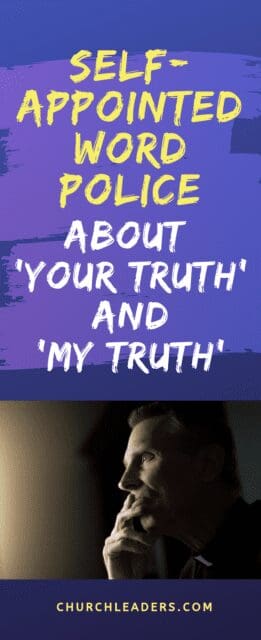Words matter. We deploy them to communicate, to capture what we are thinking, feeling, and sensing. Words can build people up or tear people down. Words can divide or they can unite. Leaders know that the leadership axiom “words create worlds” is true, that the words we use in our ministries and organizations create the cultures we live and lead in. Leaders and teachers care about words because they know the power within them. But just because words matter does not mean we should play the role of self-appointed word police.
That is, we act like it is our responsibility to monitor everything others say and offer continual unsolicited correction. I surely don’t want to be treated that way nor do I want to treat others that way. As a communicator my words are not always as precise as they should be, and I am grateful for the grace others give me, grateful when others look at the whole of my message instead of slicing a few phrases here and there.
However, there are times when inaccurate and hurtful phrases become so frequently utilized and so commonly expressed that they should be corrected.
“My truth” is one of those phrases that should be reconsidered by those who use it. You have likely heard: “That is my truth,” or “know your truth.” We should stop saying that. You may have to catch yourself because it is one of the phrases that has caught on, one of those phrases that people use without even knowing why they are using it.
How dare I suggest that someone should not speak “their truth?” But what if this is “my truth?” Shouldn’t I be able to speak “my truth?” Your truth (and my truth) may not be the truth, and that is not just my truth but the truth. Here are two reasons we should remove the “my truth” phrase from our vocabulary:
1. It is illogical; there is one truth.
Leaders often insist on “one source of truth” when they analyze and evaluate data and metrics surrounding their work. There is immense frustration when different people show up to meetings with different data because they are pulling reports from different sources or pulling them from their own perceptions. Inevitably someone will say, “This is ridiculous. We need one source of truth.” No wise person in the meeting disagrees. No one suggests, “let’s just all go back to our work and live our truth.” That would be insane because one group would be responding to inaccuracies. No, people need to go back to their work and their roles responding to the actual truth.
Certainly, there are multiple views or interpretations of truth, but there is one truth. There are multiple ways to express the truth, but there is one truth. Declaring something as “my truth” gives the inaccurate and unhelpful perception that truth is changing, that truth is not a constant and inevitable reality we must respond to. It does not help people but hurts them as we are left without anything consistent or trustworthy on which to stand.
Just because I insist something is true for me or “my truth,” does not mean it is “the truth.” There have been plenty times in my life when I have believed something as true for me but it was not actually true. No matter how much I believed the tooth fairy was the one putting a few bucks under my pillow, “my truth” was not “the truth.” My insistence that the tooth fairy was true did not change the reality of the truth — that I should not build my life or set my hope on what I held to as “my truth.”
2. It is unspiritual; maturing as a Christian is desiring His truth, not designing our own.
The desire to hold to “my truth” is not a new desire. Like Adam and Eve in the Garden, we can insist it is our right to eat from the tree of knowledge of good and evil, that it is our right to decide what is right and good and what is not. But by doing so, we place ourselves in the position of defining truth. We are not the creators of truth, and we should not act (or speak) as if we are. As Christians we believe that He is the true and faithful One. And as Christians we must be consumed with Him and His truth and not our own.
The Christian faith is liberating because we don’t have to build our lives on “our truth.” We follow the One who called Himself “the Truth.” If we know Him and hold to His truth, we are free. We are free from the pressure of constructing our lives on our fragility, on our limited knowledge, and our limited understanding. We trust Him and His truth.
Because I don’t want to be a member of the self-appointed word police, I have tried to find something positive in the phrase. Where can an argument be made for it? In both Romans 2:16 and 2 Timothy 2:8 the Apostle Paul calls the good news of Jesus “my gospel.” He was so personally impacted by the gospel of Jesus that he carried it deeply and held to it tightly. But unlike “my truth,” the phrase “my gospel” was not a phrase about Paul’s ability or his self-reliance. He was not declaring a path for himself. He was not differentiating himself from others as if there was one gospel for him and another for someone else (see Galatians 1). To the contrary, Paul viewed himself as a fragile jar of clay holding the real treasure – the good news of Jesus (2 Corinthians 4:7). Which is how we must view ourselves – fragile and dependent on Jesus and His truth. The truth of Jesus infinitely better and more liberating than the pressure to discover and declare our own truth.
This article about self-appointed word police originally appeared here.

